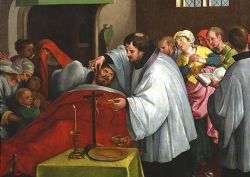 It being August, and so the Silly Season, TweedleNaughtie and TweedleWebb presented the Today program on Radio 4 this morning. Both are science-lite, but this morning TweedleWebb surpassed even himself. In an attempt to force a bun-fight between a medical sociologist and a doctor – normally as easy as torching petrol – about a study looking at the effect of religion on a doctor’s end of life practice, he declared he didn’t want to ‘get bogged down in a discussion about the representativeness of this study’. So absurd was this remark that it quite fused all combativeness out of the two contestants. The doctor emitted a curt ‘sure’ and dried up like a prune, while the sociologist started a bizarre love-in with the doctor.
It being August, and so the Silly Season, TweedleNaughtie and TweedleWebb presented the Today program on Radio 4 this morning. Both are science-lite, but this morning TweedleWebb surpassed even himself. In an attempt to force a bun-fight between a medical sociologist and a doctor – normally as easy as torching petrol – about a study looking at the effect of religion on a doctor’s end of life practice, he declared he didn’t want to ‘get bogged down in a discussion about the representativeness of this study’. So absurd was this remark that it quite fused all combativeness out of the two contestants. The doctor emitted a curt ‘sure’ and dried up like a prune, while the sociologist started a bizarre love-in with the doctor.
The study, nonetheless, is not without interest, as much for its history, interpretation and use, as for its scientific veracity. It is in fact the fourth re-write (1, 2, 3, 4) with tweaks of the same survey (there may be more – Dr No reached saturation at four) of a study originally commissioned by an anti-Assisted Dying for the Terminally Ill Bill alliance. Unsurprisingly, the first write up showed that despite the fact the Great British Public were up for euthanasia, doctors weren’t. Palliative medicine specialists, and those with strong religious views, were especially opposed to any moves to change the law in favour of assisted dying.
Write up number two had had the majority of doctors reporting that they did not take end of life care decisions expected or partially intended to hasten death; palliative medicine specialists, and those with strong religious views, were especially unlikely to report making such decisions.
Write up number three had less than one in five doctors providing CDS – ‘continuous deep sedation’ – sometimes viewed as an ‘alternative’ to euthanasia – for dying patients; non-religious doctors, and those in favour of legalising assisted dying, were more likely to make use of CDS.
Today’s paper – tiresomely hidden behind a pay-wall, although a free trial subscription is available and will provide access to the full paper – may not pull its punches, but given earlier write ups, nor does it pack any surprises. Headline findings are that (excuse the cluttered verbosity, but this is medical sociology, a discipline not exactly known for the pithiness of its prose):
• very/extremely non-religious doctors are twice as likely to expect/partially intend to bump you off compared to very/extremely religious doctors;
• non-palliative care hospital doctors are ten times more likely to expect/partially intend to bump you off than palliative care doctors (although this may be for case-mix reasons);
• very/extremely religious doctors are fives times less likely to discuss end of life care with patients, compared to very/extremely non-religious doctors – presumably on the basis that ‘God Knows Best’ – and will know when to call the patient for their ‘Final Appointment’.
Now, the interesting thing is that in none of these write ups is there anything in the least bit extraordinary. Religious doctors, surprise surprise, act in ways that honour the sanctity of life. Specialists in ‘good deaths’ – palliative care doctors – don’t, surprise surprise, rush to bump off their patients. And religious doctors would rather – surprise surprise – put their faith in their God, than rely on earthly discussions with their patients.
Sure, the study may be flawed. There are, despite TweedleWebb’s dismissal, substantial concerns about the representativeness of the sample: response rates varied widely, and the data is based on unchecked retrospective self-reporting. But, whether it is flawed or not, it seems to Dr No that this is a classic sociological ‘Is the Pope a Catholic’ study. What would be odd is if religious doctors did not honour the sanctity of life, or failed to put their faith in their God.
And yet this last write up – pretty much old hat that it is – has generated a vast amount of interest – 198 news articles on google, and counting. Dr No cannot possibly imagine why.
